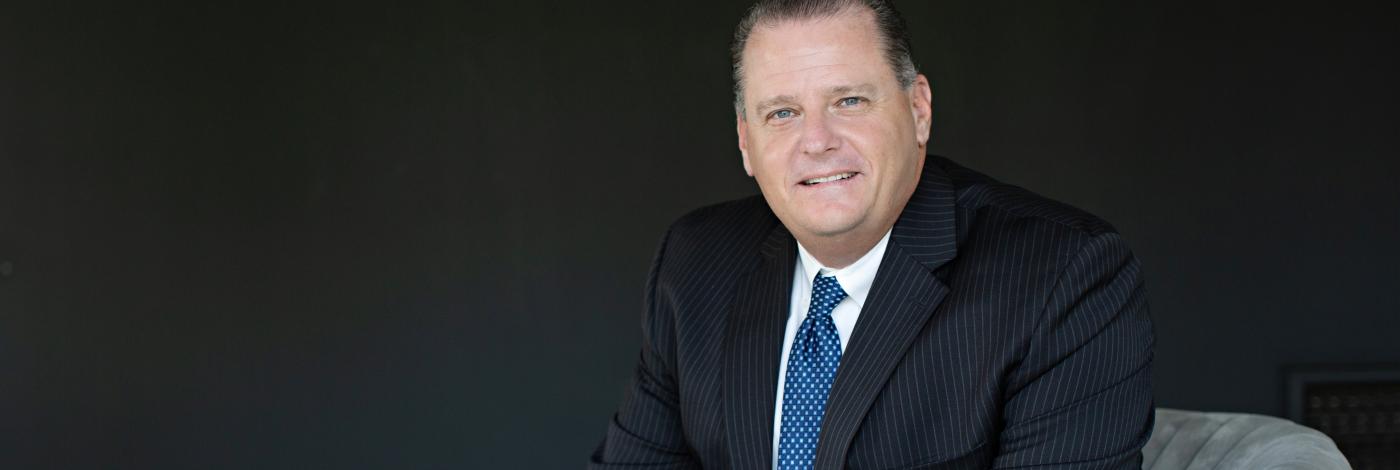Research Reveals: New Ways of Approaching the Financial Services Profession

New Inroads with Black Women
In late 2021, the American College Center for Economic Empowerment and Equality finalized and released a study based on the first pillar of the Center’s Four Steps Forward initiative – to provide empowerment and educational opportunities to Black women. As Black women are often considered the gatekeepers of their families and communities, understanding their needs and situations is key to addressing the persistent issues of inequality that adversely affect the Black community as a whole.
The study's results were revealing and continue to make waves across the industry. As a result of this leading industry research, The College took home the 2022 WealthManagement.com Wealthies Award for Industry Research Provider. A second phase of research focused on Black women will begin in 2023.
Solving for Public Trust
At the same time, the American College Cary M. Maguire Center for Ethics in Financial Services was conducting a parallel study: this one focused on the general state of trust in the financial services industry. Fourteen years after the 2008 financial crisis, the research found reasons for optimism after interviewing consumers nationwide, but also areas where the industry still has a long way to go.
The results show the industry has made progress in recent years, but more still stands to be accomplished by financial professionals. Among the pressing proof points are greater transparency, simplicity, and focus on cultivating relationships that transcend transactions.
Identifying Barriers to Career Success
The American College Center for Women in Financial Services built on the theme of forming connections with important communities through their own study aimed at financial advisors rather than consumers or the general public. The research was designed to understand advisors’ perceptions of success and to help financial services companies in their efforts to recruit, support, and retain financial professionals.
Advisors were prompted to self-identify their level of success as financial professionals and explain the reasons for that success or lack thereof, as well as what they needed to feel more successful and happier in their work. The results across the board were mostly encouraging: 7 in 10 advisors identified themselves as successful by their own personal metrics or by their ability to meet their employers’ business goals.
A Drive Toward Evolution
This triad of studies clearly shows the industry must take calls for greater community involvement, communication, education, and transparency seriously. Clients and advisors want more than a strict business relationship in financial services: instead, they desire a partnership built on trust, respect, and opportunities for continued growth. As the financial planning landscape continues to shift and change, it is up to industry leaders to open new doors and walk through them.
Read this story and more in our 2022 President’s Report.
A New Resource for a Growing and Caring Community

Studies have indicated 7% of all children have some sort of developmental disability. 26% of U.S. adults are classified as living with special needs or a disability. And yet despite these growing numbers, one is still distressingly low: one-third of caregivers for those with special needs aren’t planning for their own futures right now. Without a sound financial plan to assure their security later in life and to ensure their loved ones and dependents have the care they need, caregivers are sacrificing their own quality of life for a goal that eludes their grasp. These dedicated individuals shouldn’t have to choose between themselves and their loved ones with special needs.
That’s why I’m proud to announce the launch of a new website for the American College Center for Special Needs, which will serve as a headquarters for The College’s professionals and networks to better address the needs of caregiver clients and finally help them achieve the peace of mind they deserve.
Established in 2014 by a transformative gift from MassMutual, the Center for Special Needs seeks to be the nation’s leading voice on financial planning for professionals working with the loved ones, guardians, and caregivers of those with special needs. Supported by world-class thought leadership, programming, and education focused on the underserved but rapidly growing special needs community—including The College’s own Chartered Special Needs Consultant® (ChSNC®) professional designation—the Center is uniquely positioned to deliver a massive benefit to society and these communities.
I couldn’t be more proud to share this exciting news, and I invite you to visit the new Center website as we continue to shine a light on the Center’s work and its synergy with the only financial services designation that provides comprehensive education in special needs planning. We remain steadfast in our commitment to the special needs community, caregiver clients and loved ones alike, and hope you’ll join us in making the relaunch of this Center website a success.
Meet Mickey Rosenzweig, CLU®, ChFC®, AEP®, 2021 Alumni Hall of Fame Inductee

As an alumnus of The American College of Financial Services with over four decades in financial services, as well as the founder and CEO of Rosenzweig Financial Services—the company that bears his name—Rosenzweig has been an influential supporter of The College and its students, faculty, and staff for much of that time. This year, Rosenzweig will be inducted into The College’s Alumni Hall of Fame, a select group of graduates who have made extraordinary contributions in time, talent, and treasure to The College and to the financial services industry and society as a whole. And it likely won’t be a surprise to learn that Rosenzweig has quite few stories to tell—but the story of his journey to the financial services profession might be.
“I graduated college in 1973 and was planning to go to law school,” Rosenzweig recalls. “I decided on about a week’s notice to take a ten day vacation overseas before my term started. That ten day trip became eight and a half months living in over 20 European and Middle Eastern countries, and when I came back, I realized I didn’t want to go to law school after all. I needed a new direction for my life.”
Rosenzweig credits his brother-in-law with first suggesting he consider financial planning as a potential career—something he had never before considered. “I was definitely a hippy,” he says. “A month earlier, I was living in Goa, India, with long hair and a beard and had been to Woodstock, and a month later I was walking into Penn Mutual to interview for a position as an insurance agent, clean-cut and ready to go.”
While at Penn Mutual, Rosenzweig worked under the watchful eye of Lou DiCerbo, CLU®, ChFC®: a well-known titan of the financial services industry, longtime friend of The College, and the first-ever inductee to The College’s Alumni Hall of Fame. Naturally, this seemed like the start of a successful career. Cue plot twist.
“I worked there for four and a half months, did very well, and then left, never wanting to go back.”
Oh. Okay, then.
“I told my brother-in-law I didn’t want to do insurance,” Rosenzweig says. “I just didn’t think it was for me. So he told me he was opening up a beer brewer and distributor in Brooklyn, and that when they opened a second location, I could be a partner. Four and a half years later, I was working 75-hour weeks in the beer industry and had a wife and year-old child to support. But the partnership fell through, and I was devastated.”
It was now 1979, and Rosenzweig was looking for another career change at a time most people were having great difficulty finding jobs. But he certainly wasn’t looking to go back to financial services, because—I’m wrong again, aren’t I?
“The people I had known at Penn Mutual told me to come back to financial services, and there were potential places for me both there and at MassMutual,” he said. “I had no money, there weren’t many other options on the table, and I saw the people I had worked with years before were doing well now. My father taught me to always do the best job I could wherever I worked, and to never burn a bridge. So I sat down, thought it over, and decided to go back to insurance, and to Penn Mutual. In the end, it was the people there that convinced me.”
Because of his values and work ethic, and having parted on good terms previously, Rosenzweig found DiCerbo was more than happy to hire him back and says he remains in his debt. The rest, as they say, is history. When asked why he came back to financial services after resisting for so long, Rosenzweig laughs. “I came back for the money, and you can make a lot of money in this business. I won’t apologize for that,” he says. “Having said that, I love helping other people and I love to work hard. There’s always more people to see, and my love of the profession grew from there.”
These days, Rosenzweig works with clients whose needs run the gamut from life, disability, and long-term care insurance to pension administration, employee benefits assistance, and more. “My objective was always long-term client retention and being a trusted, knowledgeable partner for them,” he says. And that’s where The American College of Financial Services came in. “Lou was my key to The College. He would always preach that applied knowledge is power in our industry, and that The College was the citadel of that knowledge. So if I wanted to sell a lot of insurance and be competitive, I needed more and better knowledge.”
Despite resisting going back to school and the time drain of returning to studies, Rosenzweig says DiCerbo’s encouragement was the push he needed to earn his Chartered Life Underwriter® (CLU®) designation, and later his Chartered Financial Consultant® (ChFC®), with The College. “I’ve met incredible people over my time here and in my different roles with The College that have helped me grow dramatically.” He lists his three primary areas of expertise as insurance planning, estate planning, and qualified planning—and credits The College with imparting much of that knowledge. “I’ve always believed in treating other people like I’d want to be treated and offering the best value and service for my fees to clients. Sharing knowledge with clients helps them make better and more informed decisions. I don’t ever tell people what they should do; I tell them what they could do, and the rest is up to them.”
Now approaching 50 years in the industry, Rosenzweig says his focus has shifted to giving back to the profession and his community. He says it hasn’t always been easy, but doing the right thing and helping others is its own reward.
“I once met an attorney who had lost his law license for something he did. He needed insurance and came to me, but I couldn’t stand working with him as a client and was glad when we parted ways,” he said. “Several years later, his wife called me out of the blue and told me he had passed away. The police wanted to do an autopsy, but she couldn’t allow it for religious reasons and wanted to know how it might affect their insurance policy. Keep in mind, this was at 4 p.m. on a Thursday and I was playing in a tennis tournament that night. I hadn’t liked him much, but I immediately called my wife and told her I wouldn’t be making it home.”
Rosenzweig says he worked through that evening and into the following morning getting in touch with detectives, medical examiners, and every life insurance contact he could find to get answers for the widow. “I went to his funeral and listened to his son deliver the eulogy, and I learned that thanks to that insurance money I’d helped them get, both his children were able to go to college,” he says. “I’ll say it again: treat others the way you’d want to be treated, and do what’s right. It’s easy to say, but hard to do.”
Rosenzweig is full of stories like this one—something that’s not hard to imagine given his professional and life experiences. “I’ve always felt it’s important to give back, whether it’s through education or charity, and not just be a taker,” he says. “On vacation in the Philippines, I saw a water carrier who would sell water to people. I paid him for all his inventory that day, which couldn’t have been more than $20, and told him to give out free drinks to everyone working at the small airport we were at. I changed his life that day. Another time, I was in Ireland and was listening to a storyteller trying to sell his tapes and books, but was getting booed by the audience. I stepped up to sell his merchandise for him, and he had to go back to his car and get the rest of it because it sold out so fast.” He chuckles. “I like to think I’m a pretty good salesperson, too.”
Over the years, Rosenzweig has been one of The College’s greatest supporters and champions. He made his voice heard in the organization serving on The College’s Board of Trustees for a nine year period, offering advice and guidance as The College navigated the shifting landscape of the financial services profession. He also showed his dedication to supporting and nurturing the growth of students and alumni like himself as President of The College’s Alumni Association, as well as expanding The College’s mission and reach through his Chairmanship of its Foundation Board. And if that wasn’t enough, he also served as Co-Chair for The College’s three-year capital campaign, raising the needed donations from friends, alumni, and sponsors to fund The College’s educational endeavors well into the future. It’s safe to say The College wouldn’t be the same without him.
Congratulations to Mickey Rosenzweig, CLU®, ChFC®, AEP® on his induction into The American College of Financial Services’ Alumni Hall of Fame!
Insurance & Risk Management Insights
CFP Certification vs CLU and ChFC Designations

The financial services industry has long relied on the Chartered Life Underwriter® (CLU®) designation as the benchmark to determine who has extensive knowledge of life insurance. The CLU® designation is issued by The American College of Financial Services. The CLU® designation is helpful when evaluating the life insurance underwriting and risk management needs of business owners and professionals, and can be an important factor in debt agreements. The CLU® designation is also instrumental in regards to life insurance law within the context of overall risk management and helping clients to address their estate planning needs.
The CLU® designation is a five-course program that studies the practical application of risk management and the ability to manage complex financial services. The program is made up of four core courses, plus one elective. In addition, candidates must pass five 100-question, 2-hour exams (one at the end of each course). Course topics include:
- Fundamentals of Insurance Planning
- Individual Life Insurance
- Life Insurance Law
- Fundamentals of Estate Planning and Planning for Business Owners and Professionals
Other course topics include financial planning, income taxation, group benefits, investments, and retirement planning.
What does the CLU® designation mean?
A CLU® designation means a financial professional has gained an in-depth understanding of the practical, legal, and ethical aspects of life insurance underwriting and can provide the best solutions to a diverse clientele facing a range of risks and financial situations.. The CLU® designation is a significant designation for U.S. securities entities, as well as the designated business owners for securities companies and securities broker-dealers.

What is the CLU® pledge?
The CLU® designation requires a pledge to uphold the highest ethical and professional standards of conduct established by The American College of Financial Services:
“I shall, in light of all conditions surrounding those I serve, which I shall make every conscientious effort to ascertain and understand, render that service which, in the same circumstances, I would apply to myself.”
In addition, maintaining the designation requires 30 hours of continuing education (CE) credit every two years.
How difficult is the CLU® designation?
The CLU® designation is usually obtained after a number of years in the insurance business and passing licensing exams. The licensing exams are considered by most to be quite difficult, with thousands of people attempting them each year. The exams are lengthy, with many hours of study time required before taking them. The credential will ensure that you are recognized as a general insurance knowledge specialist.

What are a CLU® and a ChFC®?
The ChFC® is an acronym for Chartered Financial Consultant®. This certification program is offered by The American College of Financial Services to individuals who have completed an intensive program of study in the area of financial planning. The designation is earned once the financial professional has met all requirements to be recognized as an authoritative practitioner in financial counseling and planning. The designation is also available for individuals who have met specific educational and experience guidelines.
A CLU®, on the other hand, is the designation earned by financial professionals who have studied in-depth the risks involved with certain insurance annuities and policies, such as life insurance.
A CLU® or ChFC® designation indicates that an individual has completed a comprehensive program of study that has been developed and governed by The American College of Financial Services. Although these designations are available to all qualifying candidates, they are especially popular among those who work in financial services businesses.
What is the difference between ChFC® and CFP® certification?
The designation Chartered Financial Consultant® (ChFC®) reflects that an individual has completed advanced coursework in personal financial planning and passed comprehensive exams. A CFP® professional has also completed a college degree plus met specific coursework and passed comprehensive exams.
The CFP Board of Standards sets and enforces standards for the CFP® mark in their privacy policy, and ensures that CFP® professionals are held to the highest standard of integrity, ethics, and professionalism. The CFP Board owns the CFP® mark, CERTIFIED FINANCIAL PLANNER™, and federally registered CFP® certification.
ChFC® implies that the applicant possesses expertise in various financial planning processes, similar to the CFP® certification. ChFC® is important for advisors who offer assistance with retirement planning, estate planning, wealth management, and sell life insurance, disability income, or long-term care policies that are regulated by state insurance departments.
More From The College:
See our CFP® Certification Education Program
Learn about our CLU® Program
Get the details of our ChFC® Program
Critical Research Enables Our First Step Forward

Black women's influence on their families and within their communities is undeniable. Yet, they remain an underserved demographic in the financial services industry. Our first step forward focuses on developing programs that curate the best financial knowledge relevant to Black women to grow their wealth. The more Black women know about the barriers to financial stability, savings strategies, investing, and transferring wealth, the more their families and communities can grow in financial wisdom.
To this end, I'm proud to present the Center for Economic Empowerment and Equality's inaugural research study, Black Women, Trust, and the Financial Services Industry. We surveyed 3,500 middle-income Black women across the nation to create a holistic picture of Black women's perception of financial services and money, their wants and needs, and their role as decision-makers in their households and communities.
With this groundbreaking research, we now have actionable insights that The College plans to use as we work to improve Black Americans' relationship with money and the financial services industry. The Center for Economic Empowerment and Equality is dedicated to bringing Black women into the fold, starting with showing the financial services industry the opportunities available to better connect with Black women and better demonstrate inclusivity, empathy, and understanding.
I invite you to view the research and learn what's needed to become better partners and financial allies with Black women. You, too, can help us in our mission to close the wealth gap.
WMCP® vs CFP®

The WMCP® designation is awarded to financial advisors who have successfully completed the comprehensive certification process. WMCP®s are held to standards of excellence and must adhere to a strict code of ethics. They must also demonstrate their expertise in working with high-net-worth clients in areas like income tax, estate planning, investment management, and insurance.
Financial advisors are charged with many responsibilities, including asset management, insurance, estate planning, retirement planning, wealth management, financial planning, investment, tax, fee-based advice, regulatory compliance, debt negotiation, risk management, compliance, securities trading, and much more. Stand out from your competitors and attain greater credibility, trust, and respect by earning your WMCP® designation!
How do I get a wealth management certificate?
The WMCP® is a certification for wealth managers and investment advisors who have met rigorous requirements and passed a battery of exams. The 6 to 8-month learning experience is built for financial professionals who want to understand the intricacies of the wealth management industry and serve clients with comprehensive financial strategies, knowledge, and expertise.
What certifications do wealth managers need?
In general, wealth managers will have a bachelor's degree from an accredited university in business administration, accounting, finance, economics, or a related field. They must also complete approved graduate studies (e.g., MBA) or have earned a CPA certification. Continuing education is strongly recommended to maintain currency of knowledge—most states require their CPAs to earn 30 hours of CE credit per year.

What is a CPWA certification?
The Certified Private Wealth Advisor (CPWA) is a U.S.-specific certification that aims to set a minimum standard and best practices for professional wealth managers who work with high-net-worth clients in income tax, estate planning, investment management, and insurance.
To earn a CPWA designation, applicants must hold a bachelor's degree from an accredited institution and have one of the following designations: CIMA®, CIMC, CFA, ChFC®, or a CPA license. In addition, applicants must have an acceptable record according to the Investments & Wealth Institute’s Admissions Committee. Lastly, applicants need at least five years of experience in the financial services field.
What certifications do you need to be a wealth manager?
A wealth manager not only manages a client’s money, but also acts as a financial advisor who helps a client make the right choices in investing, saving, and planning for retirement.
The first step along the path to becoming a certified wealth manager is usually becoming a CFP® professional through the Certified Financial Planner Board of Standards, Inc. The CFP® certification is the most respected personal financial planning accreditation in the world. It has been established to provide the public with the assurance that those who are certified are indeed qualified to provide objective financial planning advice.
In general, in order to work as a wealth manager, you'll need at least a bachelor's degree.In some places, you'll also need to become a Certified Public Accountant (CPA) or Chartered Financial Analyst (CFA), which requires additional education and work experience.
What is certified wealth management?
Wealth management is an umbrella term for financial advice to high-net-worth clients, including investment planning and portfolio management. As professionals investing on behalf of their clients, a wealth manager’s goal is to help maximize the growth and preservation of clients’ assets over time.
Certified wealth management professionals have completed a set of educational requirements and achieved a status that validates their expertise in the field. Some examples include the CFP® certification, Chartered Financial Analyst (CFA), Wealth Management Certified Professional® (WMCP®), or American Institute of Wealth Management Analyst (AIA). As with most occupations, the more education you have, the more expertise you possess, and the more successful you can become.
Which is better: WMCP® or CFP® certification?
The WMCP® designation is a specialized, professional-level designation for wealth managers. It establishes the wealth manager as an expert in his or her field and provides a foundation for financial success.
The CFP® certification is the most recognized financial planning designation in North America. To earn this prestigious professional designation, knowledge and skills must be demonstrated through a comprehensive exam and adherence to stringent ethical standards.
The CFP® certification is recognized as the “gold standard” of financial planning designations. A CFP® professional will usually manage his or her own business, whereas a WMCP® practitioner may be an employee of a firm that manages money.
Invest in your career with a professional designation.
To continue providing value to your clients, you have to go well beyond the usual investment advice. Through the Wealth Management Certified Professional® (WMCP®) designation program, you can master behavioral finance and learn the advanced strategies needed to create efficient, individualized portfolios that are attuned to each of your client’s unique needs and values. Offer your clients more.
More From The College:
See our CFP® Certification Education Program.
Get the details of our WMCP® Program.
Ethics In Financial Services Insights
Getting Social Impact Right with Corporate Purpose

It has been two years since the Business Roundtable’s statement on the purpose of a corporation, which read that companies should be concerned about serving all of their stakeholders, not only their shareholders. This represents a mindset shift in business, consistent with the trends toward “stakeholder capitalism.” It has been especially evident during the global events of the last year and the ongoing pandemic, which have spurred some corporations to step up their philanthropic support and community service.
“Doing well by doing good,” a quote attributed to Benjamin Franklin, is a concept that today articulates how corporations could affect the communities in which they operate, if they run their business with purpose in mind. A related term, “social impact,” describes the intersection between for-profit practices and charitable missions, which can demonstrate measurable positive impact on stakeholders. It is about corporations making the world a better place, helping to improve quality of life while also running their businesses well, and solving big problems while serving humanity in positive ways. In a world that cynically views “business ethics” as an oxymoron, really, what does that look like?
Grab, Southeast Asia’s ride-hailing company, demonstrates a tangible example of corporate purpose with heart for its stakeholders. In addition to transportation, the company offers food delivery and digital payment services via a mobile app. While the company has had blemishes to grapple with, it is interesting to learn how a focus on social impact led Grab, a transportation tech company, to financial services. They identified and filled a real need for their unbanked and underbanked drivers. The company set up their drivers with bank accounts, thereby, enabling them to receive their paychecks through direct deposit.
Grab’s approach demonstrates a stakeholder-focused program. Why? Because its choice to recognize a stakeholder need and to meet stakeholders where they are illustrates an effort to build trust through affective symmetry. By aligning with its stakeholders’ need, Grab strengthened emotional connection, strengthening trust with their drivers. At the American College Cary M. Maguire Center for Ethics, our research has also identified that balancing symmetries in relationships is an important element of stakeholder culture within the financial industry. The Relationship Balance Model, developed by our Maguire Fellow in Applied Ethics, Caterina Bulgarella, PhD, helps financial institutions identify trust opportunities and understand how stakeholders use trust as an accountability mechanism in reducing asymmetries and/or creating symmetries in their relationships. When businesses put purpose before profit, they can lead the way in addressing social challenges, while innovating in new products.
For financial institutions, one lesson to learn from Grab’s example is to more proactively identify and act on unmet stakeholder needs. Financial institutions could start by questioning how their actions (or inactions) affect people in their organizations, as well as people impacted by them. This approach flips the typical business case equation, from a traditional view of “what’s in it for the business” to a stakeholder-focused impact analysis, as recently remarked in a commentary for Fortune by Azish Filabi, the Executive Director of the Maguire Center for Ethics.
Client advocacy initiatives that involve working closely with client support teams along with research and analytic teams could improve client experience and provide more value. Through such initiatives, financial institutions may discover first-hand the connection between employee satisfaction and client satisfaction.
Companies can be more stakeholder focused through strategies such as collecting feedback through periodic touchpoints with employees and clients, to learn insights about important elements of the employee and client experience, respectively. For employees, such feedback might raise opportunities for the company to support volunteering in the community or managing life transitions, such as the need for childcare or elder care. As an example of the former, BCG provides employees the opportunity to take a social impact leave of absence for up to 12 months. For clients, listening to experiences highlighted by client support staff and using email to communicate regularly with clients may reveal life changes meriting hardship assistance, such as when a terminal illness affects a family financially. One father shines a light on this crushing financial hardship in his deeply moving guest essay for The New York Times, “I Will Mourn My Daughter Forever. But I Was One of the Lucky Ones.”
While I’m not endorsing any company or their specific approach, I believe financial institutions can use these examples to self-initiate opportunities for purpose-driven innovation. We have all heard the expression, “Be kind – you never know what someone else is going through.” This saying calls forth the intentional practice of empathy. What would society look like if financial institutions operated with a central focus on humanity – unceasingly asking their employees and clients questions such as, “What’s happening in your life right now?” or “What do you need most?” and then audaciously helping to meet those needs. It may be a pipe dream, but I do think financial institutions could act on the insights these types of questions provide to create opportunities that nurture an impact-minded stakeholder culture.
Financial institutions may also consider adopting a framework for connecting their business strategy to quality of life improvements for the betterment of society. Drawing from my own professional experience, what I aspire to in my own research, and that which I’ve helped enable, I suggest considering the spirit of the National Science Foundation’s Broader Impacts (BI) Framework. It is a guide to help social, behavioral, and economic scientists more effectively communicate their projects’ potential benefit to society.
Leaders in the financial industry might adapt this framework to ask and answer questions such as “Who can our products empower?” “Who benefits from that empowerment?” “What concrete steps can we take to make these broader impacts more likely?”
By thoughtfully considering and articulating the potential broader impacts of financial products and services, the financial industry can advance business and social good. It may also help shift stakeholder mindsets of financial services from an industry perceived as transactional to one that is transformational.
Insurance & Risk Management Insights
How the CLU® Gives Joshua Gonzalez a Career Insurance Policy

As a financial advisor serving the busy Washington, DC metro area and its suburbs, as well as the Managing Director of his own consulting business—Modern Wealth Strategies, LLC—Gonzalez is constantly traveling to meet new clients and refresh his relationships with long-term ones, as well as keep his practice on top of the latest financial trends and developments. He says he was always fascinated by finance, and investments in particular, and was recruited to the industry in 2009 by a college friend.
Firm Facts: Joshua Gonzalez and Modern Wealth Strategies, LLC
- Independent since 2018
- 13 years in the industry
- Financial planning & investment advisory services for 40-50 clients
- $500,000 average client assets
“I started with a part-time, low-commitment position,” he says. “But I quickly learned that unless I was totally committed to the business and the craft full-time, it wasn’t going to be worthwhile. Signing to be an agent with New York Life in 2014 was a watershed moment when I turned ‘pro’ and really dove into the practice, discipline, and career.”
“Success Leaves Clues”
It was around this time that Gonzalez became aware of The College and its programs, and it sounded immediately like something he wanted in on.
“When you look at the elite top producers in the industry, almost all of them have designations, and many of them are from The College,” he says. “Success leaves clues, and it was obvious to me that this was the kind of service I wanted to be able to provide to clients.”
The first designation Gonzalez earned from The College was the Chartered Life Underwriter® (CLU®)—a program considered the gold standard of life insurance education.
“The CLU® is the unsung hero of this profession,” he says. “Anyone who is licensed for life insurance coverage should make this investment in themselves. The coursework and curriculum is illuminating, and it helps you understand how Social Security, life insurance needs, Medicare/Medicaid, health insurance, annuities, and so many other things work that are key to tailoring advice to specific clients.”
Gonzalez says the program was so transformative that he even found it changing his own financial life outside of his work with clients.
“I didn’t know what umbrella liability was until I read about it in the CLU® program,” he says. “As soon as I was done with that course, I was on the phone getting insurance coverage for everything I could. If bad luck visits you the way it does all of us, it would be a shame not to have protection that affordable and meaningful.”
Building Authentic Relationships
Gonzalez says the CLU®’s focus on financial plan building, investment advice, estate planning, beneficiary concerns, death benefits, and other features of life insurance policies allow him to speak confidently to many different people.
“My usual clients are 40-60 years old, high-paid professionals or small to medium-business owners with kids at home who want to pay off their house, pay for college, or get out of working for a living. Others may need to handle complex life insurance needs and business concerns,” he says. “The College’s training lets me holistically tie all these things together and help people in almost every major financial consideration of their life.”
While serving clients’ financial needs is a major part of the relationship between advisors and those they work with, Gonzalez says the enjoyment he gets out of his job is the ability to become part of a client’s life story, helping them to make the financial decisions that positively affect the way their life turns out.
“Money may not be everything and it may not be able to buy happiness, but the fact is things get a lot harder when you don’t have money or do the right things with it,” he says. “Most people’s problems come from what happens to their extra money, and some days I feel like a psychologist as well because if you’re doing your job right, you’ve become a friend and confidant to clients rather than just a tool. Not many other professionals can say that.”
To that end, Gonzalez says financial advisors working in today’s market have to take many things into account, including their promotion, presentation, and most importantly, projecting a sense of authenticity.
“I’m the product for clients as much as anything else. They buy me first,” he says. “You can’t change who you are to please your clients because the real you will always come out in the end. When my name pops up on a client’s caller ID, I want them to be excited to hear what I have to say. If they roll their eyes or get a pit in their stomach, I’m probably not for them.”
Cutting Through the Noise
A big part of conveying these ideas to potential clients, Gonzalez says, is by cutting through the constant noise of social media and advertising that have trained people to become indifferent and tuned out and speak to them in a way that resonates and grabs their attention. But when asked what effective “elevator pitch” strategies might be, he offers a counterpoint.
“I don’t even think there’s time for an elevator pitch anymore,” he says. “In an elevator, you have a captive audience for maybe a couple minutes. On social media, you’re shouting into a void to capture a tiny slice of someone’s attention span while they’re bombarded by a million other things. Like it or not, we live in a sound-byte-driven world, and financial professionals have to be able to articulate their entire planning philosophy and value proposition to consumers in as few words as possible.”
As the average consumer continues to become more complex and gain access to various tools and sources of information online, including life insurance calculators, some may question the need for professional financial planning when they can just do it themselves—but Gonzalez says they need to consider where that information comes from and what financial future they want for themselves and their loved ones first.
“Doing your own research today is difficult because you can find evidence to fit whatever bias you might have. Do you want to have to fit your lifestyle into whatever Social Security will give you when you get older, or do you want to be able to pay yourself in the long term?” he says. “You have to decide whether you want to go it alone or if you’d be better-served finding someone you like and trust who has the knowledge to back you up. That’s the real value financial advisors, designations, and institutions like The College provide.”
Your Inflation Field Guide
Financial professionals need to play offense when combating inflation and clients defense. Offensively, portfolios need to be evaluated to determine if they are adequately diversified and capable of delivering real long-term returns. Meanwhile, clients can benefit from maintaining a defensive position, staying aware of rising prices, and blocking impulsive purchases that can negatively impact their long-term financial planning.
Introducing Your Inflation Field Guide - two resources to help you and your clients navigate inflationary times.
- Helping Clients Navigate Rising Inflation is a white paper for financial professionals providing insight into portfolio strategies and critical considerations for clients in the accumulation and retirement phases.
- A Step-By-Step Guide to Dealing with Rising Inflation is a resource designed to be given to clients to help facilitate conversations about inflation and its portfolio impact.
Ethics In Financial Services Insights
Overconfident and Knowledgeable Investors May Be At a Higher Risk of Investment Fraud

DOMARINA OSHANA: Tell us about your dissertation. What makes you so passionate about researching investor fraud vulnerability, and why did you put your stake in this particular topic?
CHRISTOPHER RAND: Having been a financial planner for over 25 years, I have unfortunately witnessed way too many cases of fraud and attempted fraud. Whether the fraud is a huge pyramid scheme like the Bernie Madoff Ponzi affair, a telemarketer overseas who swindles a senior citizen out of their retirement account, or a family member looking to take advantage of their parents, investors need to be protected. Financial planners may spend much of their career helping a family plan for and save up a nice retirement nest egg, only to see it destroyed by unscrupulous actors. While it is common to focus on the financial loss victims of fraud experience, we often forget the emotional toll on a fraud victim. They may experience feelings from discouragement to depression over being victimized. While it may not be possible to eliminate all fraud risk for an individual, it is possible to reduce their susceptibility to being a fraud victim. Investigating ways to make an individual’s financial plan more secure through reducing fraud risk vulnerability is where my interest came from.
DO: What impact do you anticipate your dissertation will have in the financial services industry and/or the field of financial and retirement planning? In what ways do you think it might inform ethical behavior and/or encourage dialogue on ethics in fraud prevention?
CR: This research informs investors and professionals about some of the risks individuals face as it relates to investment fraud vulnerability. The topic of fraud has become more common in trade publications, helping increase advisor awareness. There also seems to be an increase in training by firms on what advisors need to watch out for on topics from elder abuse to email and wire fraud.
While training and education may be an important tool to reduce fraud vulnerability, the topics taught should be fraud-specific. It is not enough to increase an individual’s education level about investing—the new knowledge should include specific ways to identify and prevent fraud. My research revealed a surprising finding: knowledgeable investors, as well as overconfident investors, tend to have an elevated vulnerability to investment fraud risk through exhibiting behaviors and attitudes common in fraud victims. The research defined a knowledgeable investor as an individual who scored better than average on a 10-question investment quiz, and an overconfident investor as someone whose confidence level in their abilities was above average but scored below average on the same quiz. Employees and advisors in financial services likely have a higher financial knowledge than those outside of the financial services industry, yet that knowledge may not be enough to detect and deter fraud for their clients.
The advisor-client relationship is many times centered around trust as the advisor strives to handle the relationship with honesty and transparency. That trusting relationship may place an overconfident investor at a higher degree of risk if an unethical advisor was to mishandle that trust. The overconfident investor may be more likely to overlook items and less likely to do their research. Advisors can be transparent with these vulnerable investors about ways clients can protect themselves from fraud, like using a third-party custodian to hold client assets and being truthful about their work experience and credentials.
DO: In your dissertation, you found elevated investment fraud risk for knowledgeable investors is suggestive that traditional financial literacy requires modification to include information about fraud risks. How can advisors best communicate and educate investors about fraud prevention and awareness?
CR: Just because an investor is knowledgeable, you cannot assume they are at a lower risk for fraud. Knowledgeable investors may be at an even higher risk if they believe their knowledge level to be adequate and ignore fraud signals, which they may have paid attention to had they possessed a lower level of confidence.
People learn differently, so it’s best to communicate with the client through the best medium for them and bring up the fraud topic frequently. Overconfident investors are also at a higher risk of fraud vulnerability, and do not likely know they are overconfident. Advisors and employees of firms may be aware of their client’s overconfidence and, armed with the knowledge that the overconfident investor is more vulnerable, they may be able to act as their guardian and help protect their assets held at the firm. The research found overconfident investors to have a high level of confidence in the effectiveness of U.S. financial market regulation and to have a high level of comfort in making investment decisions. These two attitudes indicate an overconfident investor will assume regulation is there to protect them, make their investment decision, and move on. Advisors and firm employees should be on the lookout for attempted fraud, like an email solicitation for money that came from a fraudster, as opposed to the overconfident client.
DO: How do you explain your dissertation to someone not in your discipline? Why does it matter, and what is the key takeaway you would like to impress upon them?
CR: Investment fraud continues to rise, and all investors are at risk. Simply increasing your investment fraud knowledge is not sufficient to reduce your vulnerability to investment fraud. Obtaining fraud-specific education is a must to help protect yourself and reduce your vulnerability. Fraudsters will continue to find new and innovative ways to separate you from your hard-saved money. Take the time to educate yourself and keep up with the latest and most pervasive fraud techniques.
DO: What plans do you have for future research and/or education in fraud prevention and awareness?
CR: Fraud research continues to be limited. A primary research project focused on actual incidents of fraud would be a great way to build on this research and could explore additional attitudes and behaviors that may be common in those victims. That knowledge could provide additional evidence about the impact knowledge and investor confidence has on someone’s investment fraud vulnerability. I hope to publish my findings in a peer-reviewed journal and plan to make myself available to the media to help get the word out about investment fraud vulnerability. I have a unique background that may be of interest to the media now that I have completed the PhD I have taught financial planning courses at U.C. Berkeley and San Diego State University and have over 25 years of experience working as a financial planner. That unique background may pique consumer media interest and help provide the platform needed to discuss investment fraud vulnerabilities.
DO: How has The American College of Financial Services prepared you to help individuals and companies be more sensitive to ethical issues and think more critically about solutions for the benefit of society?
CR: The process of obtaining a PhD from The College changed how I approach challenges. I think more critically when working on projects, challenging things I assume to be true. Historically, I may have quickly researched an item with maybe one source, whereas now I will typically use multiple sources to confirm if my understanding is accurate.